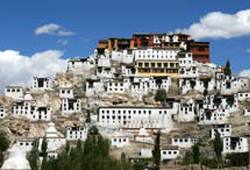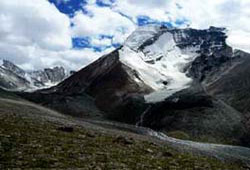HEMIS TO TSOMORIRI
Rupshu is a vast area to the south east of Ladakh, on the road from Manali to Leh. The valley lies at an altitude of 4,000 to 5,000 meters. Cultivation is difficult because of the extremely cold and dry climate, though there is ample grazing land. The small population is thus widely spread and consists mainly of nomadic shepherds, called Changpas . The Changpas also engage in trade and work the caravans between Ladakh, Lahoul and Spiti.
The area is rich in wildlife including the kyang (wild ass), red fox and the rare, highly endangered snow leopard. Black-necked cranes and bar-headed geese flock to the lakeside for breeding during the summer months. Tso Kar is another brackish lake and this whole region has supported a vital salt industry that allowed the Changpas to trade with merchants from the other regions of Ladakh.
ITINERARY
Duration: 15 Nights / 16 Days Best session: June to September
On arrival meeting and assistance at the Airport followed by the traditional welcome by garlanding and then escorted transfer to your hotel. Rest of the Day is leisure. Overnight at hotel.
Day 2: Delhi - Leh (Complete Rest in Leh for acclimatisation)
Take the morning flight for Leh. Check into the guest house and relax the whole Day. This is necessary for getting acclimatised. Overnight at the hotel.ss
Day 3: Leh - Shey - Thiksey - Hemis
On this Day you will go to sightseeing trip to some ancient monasteries in this area.

Shey Gompa is about 15 kms from Leh. It used to be the summer palace of the kings of Ladakh. There are lots of Stupas and Gompas built around the palace. Shey palace was built by Deldan Namgyal in the beginning of 17'Th century AD. Main attraction in Shey is the 12m Shakyamuni Buddha statue inside the Dresthang Gompa.
Thiksey Gompa close to Shey is about 17 kms from Leh. The monastery is considered to be one of the most beautiful in Ladakh and belongs to the Gelukspa order.
Hemis, about 45 kms south of Leh it is one of the most famous and largest monastery in Ladakh. It belongs to the Drukpa order and was founded in the early 17th century. The setting is perfect with the monastery cardled in a lovely valley, surrounded by streams and fronted by long Mani walls. Overnight stay at the guest house/tent at Hemis.
Day 4: Hemis - Shang Sumdo (3850m)
ToDay we leave the Indus valley. We descend towards Martselang, and then follow the valley, which is fairly narrow in some places, continuing along the riverbed to Shang Sumdo. A short and pleasant stage, in anticipation of the next two long Days.
Day 5: Shang Sumdo - Latza Kongmaru (4800m)
We progress along the river whose banks are studded with ochre rocks.From Chukirmo village, the track leads into narrow gorges, where ponies need to be unloaded twice, and climb up to the base of Kongmaru La.
Day 6: Latza Gongmaru-Kongmaru La (5030m) - Langtang Chu (4250m)
From the pass, there are great views north towards eastern Korakoram and China , whilst the southern view is dominated by the shapely Kang Yatze (6400m) and the Ladakhi range. We take a ridge trail and descend zigzagging across scree. Afterwards, the path descends easily towards the Nimaling summer pastures and the Markha valley, the most beautiful valley in Ladakh.
Day 7: Langtang Chu - Yakrupal (4700m)
We climb up the large valley, and, after crossing a stream, carry on along a wall of moraine.
Day 8: Yakrupal - Zalung Karpo La (5200m) - Sorra (4200m)
We carry on upwards until the valley divides, where we fork right. From the pass, we follow a ridge trail that leads to another pass, and then plunge into the valley.
Day 9: Sorra - Dat (4200m)
We follow beautiful woody gorges until they widen into a valley. Manis and shortens are scattered along the trail that leads along the Sara and Dat rivers. Dat is a verdant village, where arable farming uses every inch of land.

An easy climb takes us up to the pass, where we enjoy a dramatic view over the Rupshu. Sometimes we are overtaken by caravans of "Khyangs", wild donkeys that frighten our ponies.
Day 11: Lungmo Che - Lun (4100m)
The landscape completely changes, turning into into a vast arid plain where the Zara Chu flows (dry from August on). Tibetan nomads populate the area.
Day 12: Lun - Marang La (5300m) - Takh
The path leaves the river and leads up to a beautiful plateau at 4500m. We climb up gently to the last pass. Then it is a long descent towards Takh.
Day 13: Zozinggo to Gyama via Lanyarla (5500m)
Day 14: Gyama to Korzok Phu via Nyalangnyugu La (5100m)
Day 15: Korzok Phu to Tsomoriri Lake
Day 16: Tsomoriri to Leh (Drive)








